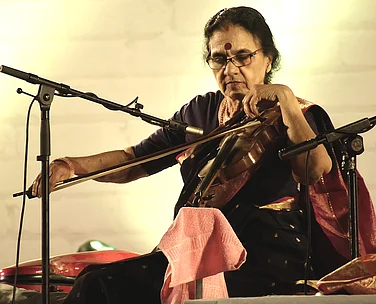It is time that civil society and the lawful government asserted their authority and primacy over the daredevil heroes of crime and banditry.
This statement of President K.R. Narayanan articulates succinctly the nations feeling of outrage at the abject surrender of the Karnataka and Tamil Nadu governments to jungle outlaw Koose Muniswamy Veerappan. For, in a little over a fortnight, without firing a single shot, a clutch of inveterate bandits and confused Marxists have coerced the State into submission, aborted the process of law, and temporarily brought to a standstill the glitzy dotcom city of Bangalore. Rarely has the State capitulated so easily, rarely has it appeared so ineffectual in countering the challenge to its authority.
Particularly galling has been the alacrity with which the two chief ministers, S.M. Krishna of Karnataka and M. Karunanidhi of Tamil Nadu, have conceded Veerappans demands of releasing five Tamil extremists incarcerated in Tamil Nadu and another 51 tada detenus in Karnataka jails. Not only has the State yielded to the terror tactics of a fugitive, its also been blackmailed into freeing those whom it had booked for waging war against the State.
Indeed, the message from Bangalore and Chennai is: the State is soft, that it can brought to its knees easily, that the writ of those who brandish guns runs parallel to its own.
Says former Union home minister Indrajit Gupta, "Theres no doubt Veerappan is a criminal and people in authority shouldnt go soft on criminals because that leads to further complications." Agrees former Delhi police commissioner Vijay Karan, "I know you have to look at the consequences if Veerappan kills Rajkumar but at the same time, post-Kandahar, I wonder what message were sending out to terrorists. Such episodes shouldnt happen again."
Currently, few are worried about the cracks in Bangalores image of being Indias Silicon Valley. Economist and former deputy chairman of the Karnataka Planning Board, Dr D.M. Nanjundappa, estimates the state lost about Rs 15,000 crore due to the kidnapping crisis. Yet Nanjundappa argues, "What is important now is not the economic loss but one of where the country is heading and whats happening to our civil society and effective governance."
But Veerappan is no ordinary criminal, nor is Rajkumar a faceless victim. Accused of murdering over 130 people, the brigand has exploited the thespians iconic status in Karnataka to expose the vulnerability of the two governments. It was popularly feared that were Rajkumar to be harmed, itd set off a backlash against Tamils in Karnataka. This the actors fan club reinforced in the immediate aftermath of the kidnapping, quick as it was to go on the rampage.
This is why the Presidents veiled indictment of the two states doesnt find an echo in Karnataka and Tamil Nadu. Here, the people endorse Krishnas and Karunanidhis handling of the situation, believing their acquiescence is aimed at achieving the larger collective good of protecting Rajkumar and the minority Tamil community in Karnataka. Noises can already be heard against what is considered the insensitivity of those in Delhi, their sudden clamour for upholding the authority of the State.
Leading the charge is the beleaguered Krishna, who told Outlook, "Sometime ago, our external affairs minister took militants in a special aircraft to Kandahar and handed them over to their friends. That did not bring a bad name to India, did it? People who sit in Delhi and talk about this crisis or write about it have no inkling about the feelings of people in Karnataka. Where was this national conscience when the government set free terrorists for securing the release of the then Union home ministers daughter?" His TN counterpart Karunanidhi explains the capitulation of his government thus: "The kidnapping of Rajkumar is like a fine piece of fabric stuck on a thorn. A wrong move only tears the fabric, there is no loss to the thorn. The need of the hour is to secure Rajkumars release as it is directly linked to the safety of Tamils in Karnataka."
In fact, theres only derision for former CM Jayalalithas criticism of the two governments. She said: "I am sure the people of our nation will share my feelings whether these two governments are really necessary at all as they have individually and in combination failed to establish the rule of law which is the hallmark of our democratic process."
For instance, MP and mgr admk general secretary S. Thirunavukkarasu scoffs, "The Veerappan sagas been on for years. What did she do in her time? What the two CMs are doing now deserve the support of all sections." Adds tmc leader and aiadmk ally G.K. Moopanar, "There can be arguments for and against the decision to accept Veerappans demands. Right now, Rajkumars release is top priority."
The popular perception in Tamil Nadu and Karnataka is the two states have come together at a crucial moment and are working in tandem to ensure that the forces of competitive chauvinism are kept at bay. Leaders of almost every party praise Karunanidhi and Krishna for maintaining law and order.
This, though, is making the best out of what is essentially a very depressing scenario. As K.H. Srinivas, Karnatakas leader of the Opposition in the Legislative Council, says, "Its what you can call the devils alternative. Weve to send a message to Veerappan that we are surrendering to him because we are caught in a tricky situation."
The moot point, then, is: couldnt Karnataka and Tamil Nadu have handled the Rajkumar kidnapping more astutely, without conveying the impression of having keeled over too easily, too fast? Will this encourage other misguided adventurers to extract concessions from the State through terror tactics?
But first, the psychological underpinnings of kidnapping. Kidnappers derive their bargaining power from the notion that the State is responsible for all its citizens, that their protection is its primary duty. Yet, simultaneously, in attempting to impose his will on the government through abduction, the kidnapper also challenges a prime defining feature of the State - that it is the sole repository of all coercive powers in society. Indeed, no State worldwide can command the respect and obedience of its citizens unless it prevents the dilution or usurpation of its coercive powers through illegitimate, undemocratic measures.
It is this clash between the duty of the State to protect its citizens (in this case, Rajkumar) and the need to preserve its exclusive control over coercive powers (render Veerappan powerless) that explains the unease over the Veerappan-Rajkumar affair. For those in Karnataka and Tamil Nadu, Rajkumars safety takes primacy over the compulsion of the State to maintain its supremacy. For most others, this act of compassion undermines the very rationale of the State.
Yet there is near unanimity that this isnt the appropriate time for the State to assert its authority - it should have nabbed Veerappan before or must hunt him down after Rajkumars release. Says a horrified Karan, "I agree it is wrong to bend down before Veerappan. They should have addressed this problem long ago. How could they have allowed Veerappan to carry on like this for so long?"
Frontline editor N. Ram blames the crisis on the ambivalent approach of the two states. He explains, "There was confusion in pursuing two different paths - amnesty for Veerappan or outright capture. I hope once the hostage crisis ends the two government would evolve a right approach to end this problem once and for all."
Karnataka bjp leader Jagdish Shettiar, too, argues that Krishnas deft handling of the crisis should not gloss over the States inability to apprehend Veerappan and uphold its primacy. For one, the Special Task Force (stf) should have been activated more effectively to neutralise Veerappan. "If the deadlock continues for a few more days," says Shettiar, "people will lose faith in the administration."
Argues Srinivas, "The greatest lapse of this government is that it has not reviewed all aspects of law and order, particularly Veerappans crimes, after it was voted to office. The government had completely forgotten to act on the report of Arkesh (a commandant of crpf, Hyderabad, whod served with the stf for two years). His report warned of the possible abduction of some people and Rajkumars name was top of the list. When I asked the CM this, he said he had not been informed of Arkeshs report." In other words, a negligent State is ultimately pushed into being a soft State.
Others, though, think the State is often boxed into a corner due to the carelessness of its citizens. As a senior TN intelligence officer involved in the Rajkumar rescue mission says, "The present crisis is the result of our vips scant respect for security arrangements. (The Karnataka government had warned potential victims of Veerappan that they must inform the government if they were travelling beyond Mysore.) When the vips gleefully violate the security norms, its not fair to say the state apparatus is weak. I can say with a certain amount of authority that if the vips follow the security norms, none of the crisis we have witnessed over the last 10 to 14 years would have risen."
Indeed, more than anything else, it can be argued the Indian State turns soft only when vips or members of the influential middle class are taken hostage. Rajkumar isnt Veerappans first kidnap victim. Earlier, in 1995, the brigand had abducted three forest officials; ditto in 1997 when he kidnapped 12 forest guards. Later the same year, he whisked away two wildlife photographers. In all these cases, the State talked tough, opened informal channels of negotiations and managed their release without eroding its authority.
This is in sharp contrast to the response of the State to Rajkumars abduction, or even to the kidnapping of Rubaiya Sayeed and the hijack of the Indian Airlines plane to Kandahar. And this dichotomy of approach is not a good thing. The State must evolve a uniform policy of not giving in irrespective of the status of the hostage. Only then can the State guard itself from blackmail and terror tactics.


























